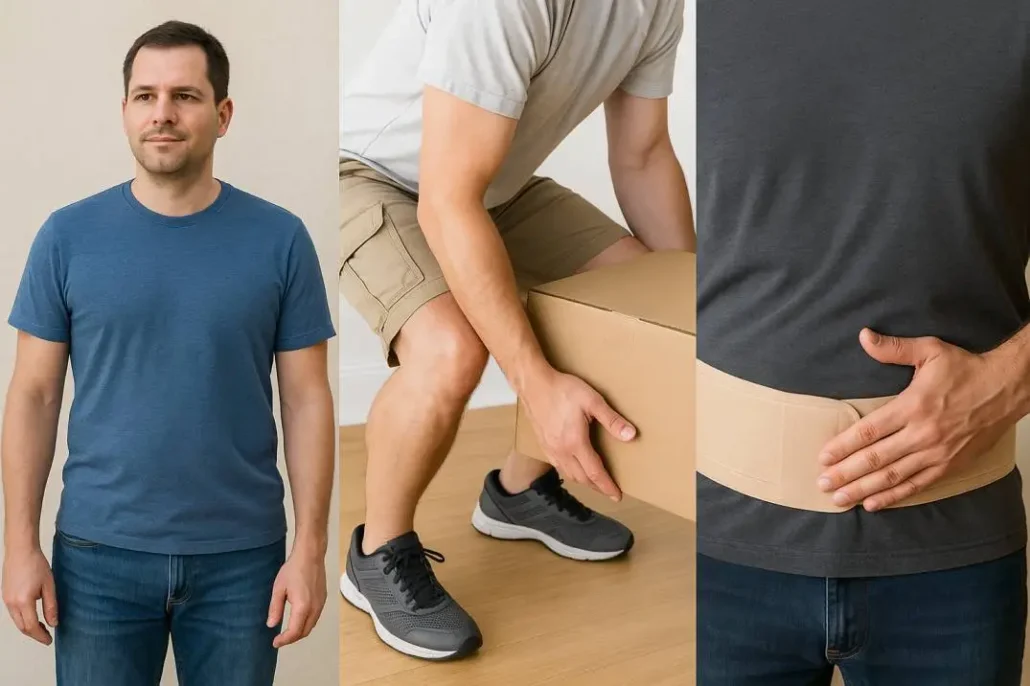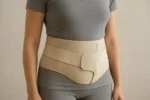Your Guide to Natural Hernia Discomfort Remedies
BlogLiving with a hernia can be a daily challenge. The persistent ache, the bulge that serves as a constant reminder, and the worry about making it worse can significantly impact your quality of life.
While medical advice is paramount for treating the hernia itself, you may be wondering what you can do at home to manage the discomfort.
This guide is designed to walk you through practical, natural remedies that can help ease hernia-related symptoms.
We will explore gentle exercises, dietary adjustments, and lifestyle changes that may offer relief.
It is crucial to understand that these methods are for managing discomfort and are not a cure for the underlying hernia, which often requires medical intervention.
Here, we will cover which exercises are safe, what foods to eat (and avoid), and how simple lifestyle tweaks can make a difference.
Let’s explore how you can take an active role in managing your comfort while you navigate your hernia treatment journey.

What Exactly Is a Hernia?
A hernia occurs when an internal organ or fatty tissue pushes through a weak spot in the surrounding muscle or connective tissue.
This often results in a noticeable bulge or lump, most commonly in the abdomen or groin area. Common types include inguinal (inner groin), femoral (outer groin), umbilical (belly button), and hiatal (upper stomach) hernias.
The primary cause is a combination of muscle weakness and strain. This strain can come from various sources, such as heavy lifting, chronic coughing, straining during bowel movements, or even pregnancy.
While some hernias are asymptomatic, many cause discomfort, aching, or a feeling of pressure, especially when standing, straining, or lifting.
Can Natural Remedies Actually Help with Hernia Discomfort?
Yes, natural remedies can play a significant role in managing the symptoms associated with a hernia.
While they cannot cure the hernia or make the bulge disappear, they can help reduce pain, pressure, and discomfort. The goal of these remedies is to minimise strain on the weakened area and support your body’s overall wellness.
Think of it as managing the environment around the hernia. By strengthening core muscles, avoiding activities that increase abdominal pressure, and maintaining a healthy digestive system, you can decrease the day-to-day irritation.
These strategies are supportive measures to be used alongside your doctor’s recommended treatment plan.
Safe Exercises for Hernia Discomfort Management

Certain exercises can help strengthen the muscles around the hernia, providing better support and potentially reducing discomfort. The key is to choose gentle, low-impact activities that do not increase intra-abdominal pressure.
Always get approval from your hernia doctor or a physical therapist before starting any new exercise routine.
Recommended Gentle Exercises:
- Walking: A simple yet effective low-impact cardiovascular exercise that improves overall fitness without straining the abdomen.
- Swimming or Water Aerobics: The buoyancy of water supports your body, allowing you to strengthen muscles with minimal strain on your core.
- Gentle Yoga or Pilates: Focus on poses that strengthen the pelvic floor and deep core muscles. Poses like the Bridge Pose and Pelvic Tilts can be beneficial. Be sure to inform your instructor about your condition.
What Exercises Should You Avoid with a Hernia?
You should avoid any activity that involves heavy lifting, straining, or intense core work that crunches the abdomen. These actions increase pressure and can worsen the hernia or cause significant pain.
Exercises to Avoid:
- Heavy weightlifting (especially squats and deadlifts)
- Traditional crunches and sit-ups
- High-impact sports that involve jumping or sudden twisting
- Any exercise that causes you to hold your breath and bear down (the Valsalva manoeuvre)
The Role of Diet in Managing Hernia Symptoms

Your diet has a direct impact on your digestive system and, consequently, the pressure within your abdomen. A well-managed diet can prevent constipation and bloating, two major contributors to hernia discomfort.
What Foods Should You Eat to Reduce Hernia Discomfort?
Focus on a high-fibre diet to promote regular, easy bowel movements. This reduces the need to strain, which is critical for managing a hernia.
- High-Fibre Foods: Include plenty of fruits (berries, apples, pears), vegetables (broccoli, carrots, leafy greens), whole grains (oats, brown rice, quinoa), and legumes (beans, lentils).
- Lean Protein: Choose chicken, fish, and tofu to support muscle health without the high fat content that can slow digestion.
- Hydration: Drink plenty of water throughout the day to help fibre do its job and keep stools soft.
What Foods Should You Avoid with a Hernia?
Certain foods can cause gas, bloating, or acid reflux, all of which increase abdominal pressure and can aggravate hernia symptoms, especially a hiatal hernia.
- Gas-Inducing Foods: Limit your intake of carbonated drinks, beans (if they cause you gas), and certain vegetables like cabbage and Brussels sprouts.
- Spicy and Acidic Foods: Tomatoes, citrus fruits, and spicy meals can trigger acid reflux, worsening hiatal hernia symptoms.
- Fried and Fatty Foods: These can slow down digestion and contribute to discomfort and bloating.
Food Category | Recommended Choices | Foods to Limit or Avoid |
Fruits | Berries, melons, bananas, pears | Citrus fruits (oranges, grapefruit) |
Vegetables | Carrots, green beans, cucumbers, spinach | Cabbage, onions, broccoli (if they cause gas) |
Grains | Oats, brown rice, whole-wheat bread | Refined white bread, pastries |
Proteins | Grilled chicken, fish, tofu, eggs | Fried meats, fatty cuts of red meat |
Beverages | Water, herbal tea (non-caffeinated) | Carbonated drinks, coffee, alcohol |
Lifestyle Changes to Minimise Hernia Strain

Beyond diet and exercise, simple adjustments to your daily habits can make a substantial difference in managing hernia discomfort.
Maintain a Healthy Weight
Excess body weight, particularly around the abdomen, puts constant pressure on the abdominal wall. Losing weight through a healthy diet and gentle exercise can significantly reduce this strain and alleviate symptoms.
How Should You Lift Objects to Avoid Hernia Pain?
Proper lifting technique is essential. Never lift with your back. Instead, bend at your knees, keep your back straight, and lift with your powerful leg muscles. Avoid lifting objects that are too heavy for you to manage comfortably.
Can a Hernia Support Belt Help?
Yes, a hernia truss or support belt can provide temporary relief by applying gentle compression to the hernia, keeping it in place and reducing discomfort during physical activity.
However, this is a temporary fix and not a long-term solution. Consult your doctor to see if a support belt is appropriate for you and to ensure proper fitting.
Key Takeaways
- Natural remedies do not cure hernias but can effectively manage symptoms like pain and discomfort.
- Always consult a healthcare professional before trying any new remedy, diet, or exercise.
- Focus on gentle exercises like walking and swimming, and avoid heavy lifting or intense abdominal workouts.
- Adopt a high-fibre, low-acid diet to prevent constipation and bloating, which worsen hernia symptoms.
- Lifestyle adjustments, such as maintaining a healthy weight and using proper lifting techniques, are crucial for minimising strain.
Frequently Asked Questions (FAQ)
Q: Can you heal a hernia naturally without surgery?
A: No, you cannot heal a hernia naturally. A hernia is a physical tear in the muscle wall, and natural remedies cannot repair this tear. Surgery is typically the only way to permanently fix a hernia, although not all hernias require immediate surgery.
Q: Is it safe to massage a hernia?
A: You should not massage a hernia directly without guidance from a medical professional. While a doctor might show you how to gently reduce (push back in) a reducible hernia, improper massage could cause pain or complications.
Q: Can stress make hernia pain worse?
A: Yes, stress can indirectly make hernia pain worse. Stress often causes muscle tension, including in the abdominal area, which can increase discomfort. Stress-reducing techniques like deep breathing and meditation may help manage pain levels.
Q: Does lying down help hernia pain?
A: Yes, lying down often provides temporary relief from hernia pain. This position takes the pressure of gravity off the abdominal wall, allowing the hernia to retract and easing the feeling of pressure or aching.
Q: When should I see a doctor for my hernia?
A: You should see a doctor as soon as you suspect you have a hernia. Seek immediate medical attention if you experience sudden, severe pain, nausea, vomiting, or if the hernia bulge becomes firm, tender, and cannot be pushed back in, as these are signs of a medical emergency (strangulation).


 +919011100010
+919011100010 


